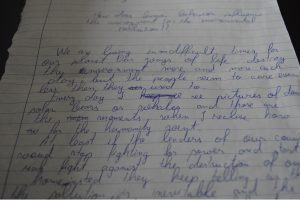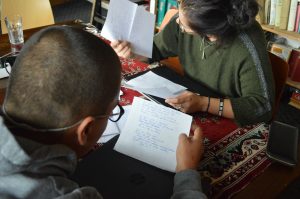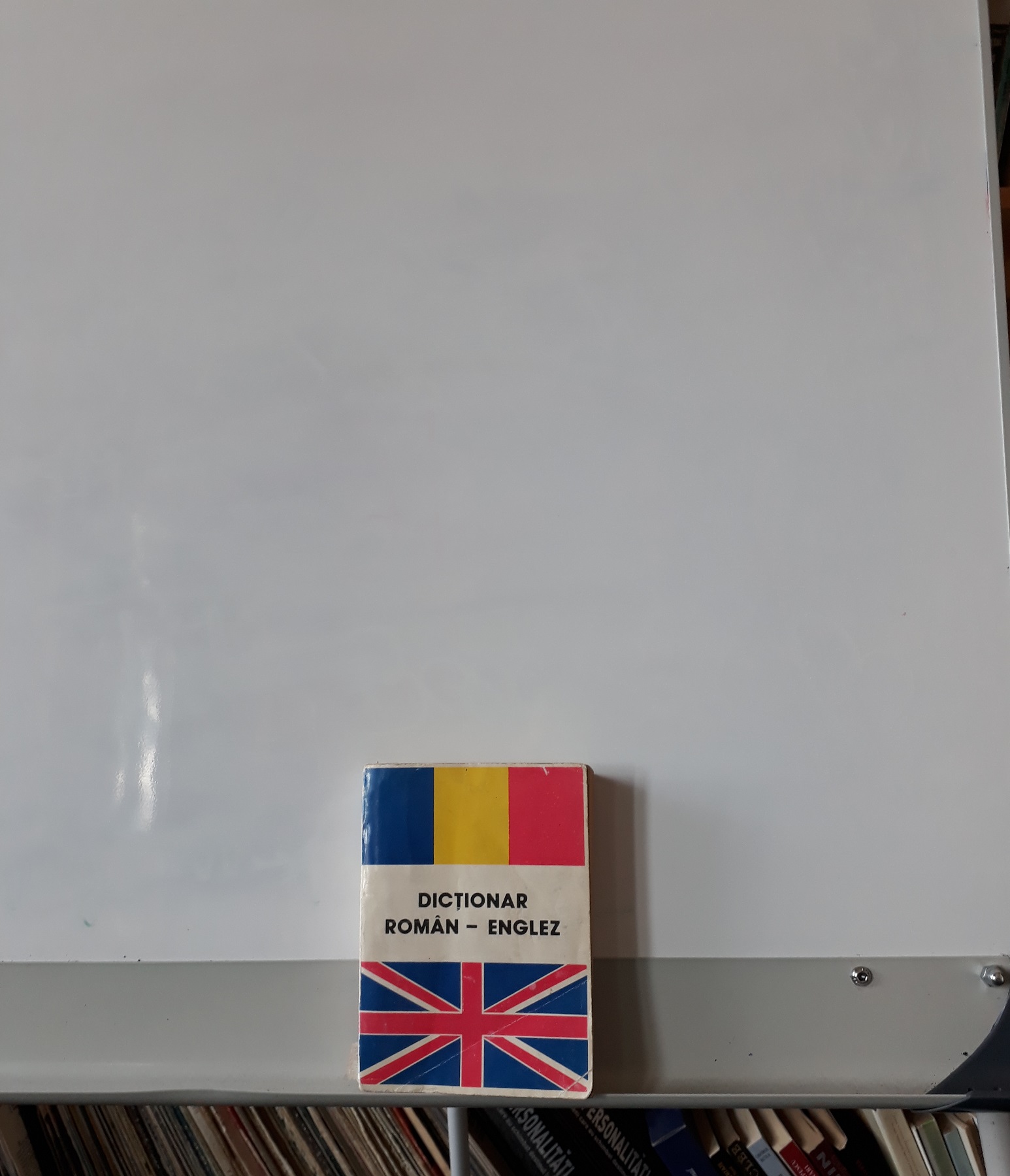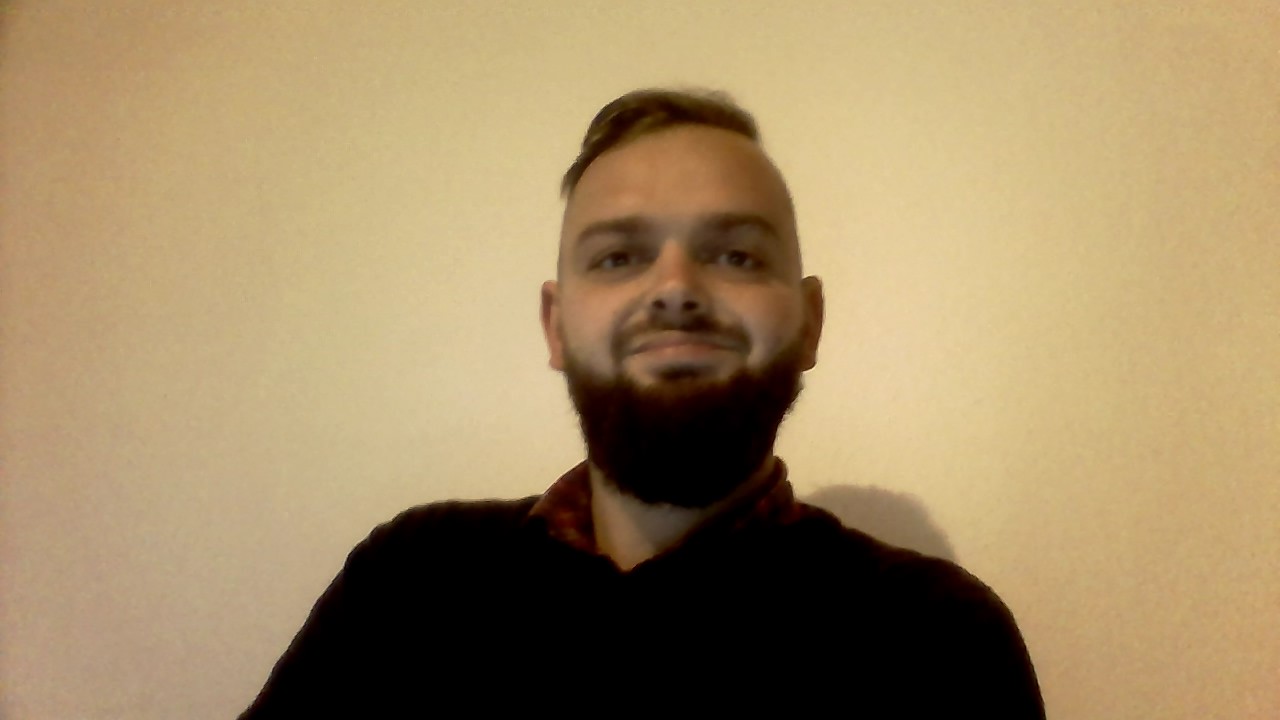Plastic rules the world
In our project we are concerned with “teaching” children how to recycle, pointing them out what trash belongs where, what effects all the trash has on the environment, what happens to the trash when it is not sorted accordingly. We have implemented various activities in the schools in the area. We have built trash bins with students from the lower classes and discussed the different types of trash to them. In a playful way we tried to convey this knowledge, non formal education, of course.
In the higher classes we concentrated on the concrete influence of the individual in this context of environmental protection. With the students we watched videos that deal with the topic. We also talked about ways of living “greener”.
I am convinced that with our project we had an influence on the students.
But, I go into a super market, which one doesn’t matter. There I can buy organic vegetables, which are packed in plastic, so that they don’t come into contact with the other vegetable, which is called inferior. I can buy electronic devices for a low price, whose packaging (made of plastic, of course) is so complicated to open, that I have to buy scissors to open it, made of plastic, of course. (I don’t want to talk about the manufacturing process of the devices at this point, that would lead too far.) When I have slowly filled my shopping cart with stuff to eat, go to the bathroom and load my fancy mobile phone, my shopping cart is already so full of plastic that I would like to leave it standing. But, according to maslow’s pyramid of needs, I have to, at least eat and go to the bathroom. So I buy all the stuff and I am happy that I have saved a little money because the supermarket is so crassly cheap. Of course I forgot my various jute bags, so I have to buy plastic bags. Also due to the fact that the charming cashier doesn’t let me use the carton box I found in his well-assorted supermarket. I could at least burn the box without a guilty conscience. Well then, I have to eat.

The supermarket is an indication of how far we have come in terms of environmental protection. And it doesn’t matter whether it’s a supermarket in Germany or Romania. Plastic is everywhere. The companies market themselves as green companies, because it is socially desirable and the managers try to get good promo. But the content of the supermarkets reflects a different picture.
As I said, in our project we try to draw attention to a conscious life in the environment. But large companies are always pointing out limits to me. Of course I can teach the children to recycle things and talk to them about the environment. But it doesn’t reduce the amount of plastic produced. So we need to fight the causes. I do not believe that the market regulates itself. That is a neo-liberal misbelief.
So should politics set limits on the market? I am in favor of it. But that demands voters. People hate laws. I can fully understand that. But something has to happen.
I can shop in a fancy shop that sells stuff without packaging. But I don’t find it in rural Romania or Germany. For that I would have to drive into a city. And since there is no bus after 20h, I would have to go there with my diesel and shop in a shop that I can’t afford. So I would contaminate the environment with my diesel, as well as what I find worse as a selfish person (sorry environment)! Because I can’t do my weekly shopping in this shop. So i would starve!
I have no recipe to solve this problem. Maybe time will heal all wounds and in 50 years there will be no more plastic packaging. In any case, it makes a lot of sense to make the people (in my case young people) aware of the environment, to be more attentive and to consciously separate the trash. Even if it doesn’t affect the owner of the supermarket and he doesn’t change his behavior.
After all, the young people’s consciousness is changing and more and more people are going on the streets. Well, a start!
My reflection about the competition of essays
Since the end of January I have been in Romania within the framework of an EVS in the organisation Curba de Cultura. And thus also in a project called BYSC-E, in which there are two more volunteers, with whom I also share a house.
Now about 8 months have passed and we have organized many different projects and events.
The basic idea of the project is to teach children and young people about environmental issues. But apart from imparting knowledge, it is also (and above all) about rising awareness towards topics such as recycling, environmental pollution and one’s own ecological behaviour. The mediation takes place in schools and outside the schools.
In the course of time we have planned and carried out many “school lessons”. But our didactic plan differs from that of the school. We focus on non-formal education and structure our lessons accordingly.
We go to schools and build bins with the young people in which they can separate the trash and we talk to the pupils about recycling and the responsibility of each individual. This usually takes place in the lower grades.
We try to convey knowledge in an interesting and appropriate way for the target group, through games or interactive design.
We also offer many activities outside the school. On World Environment Day, for example, we have organized an exhibition and a debate in our youth centre. We have invited young people to talk to them about their future in an increasingly globalised world and what opportunities each individual has to contribute to a more ecological world.
During the school holidays we organized a camp in which we dealt with four days of environmental topics. We did workshops with the children where they could try out how to make useful things out of trash. We also organized a hike with the children to pick up the trash in the forest.
Besides these activities, there were also activities for which each of us was individually responsible.
As described above, we go to schools to discuss environmental issues with the students. Besides lower grades we also went to high schools.
In this context I was responsible for a certain activity.

The idea was to organize a competition based on creative writing in the 12th grade. Of course thematically appropriate. So I thought about which topic could be interesting for the target group and how I could implement it. The topic was “How does human behavior influences the environment ( or the environmental pollution) ?”
I decided to leave it up to the students to choose which text form to use, so it could be an essay, a poem, a song or something like that. The idea was to give the students the plan so that each student could write something. One week after the writing I should go back to the same class to “award” the best text and go deeper in the topic.
So I went to school with this plan. I presented my idea to the students in the presence of the teacher and focused on the free choice of text. I think this was something new for the students. The focus, as mentioned above, is on non-formal education. I wanted the students to know that they could express themselves the way they wanted.
But (unfortunately) it went a bit different. While I was still explaining my plan, I was interrupted by the teacher who reminded the students how to structure an essay and remind them of the corresponding school lessons. She also told the students that they should substantiate their texts with many facts. I explained again that each student can express him- or herself as (s)he wishes. And that it will not evaluate with marks. So the students started writing and every student wrote something on his or her paper. I took the texts with me to read them. Contrary to my expectations, many students disregarded the teacher’s instructions and wrote very personal and poetic (regardless of a perfect structure) texts. Much to my delight.
The next week I went back to class to talk to the students about their texts. Unfortunately there was no real discussion and I decided to change the content of the lesson. I also decided not to award the best text.
Two things I learned during this activity or were a gain in knowledge for me:
1. I was very surprised by the content of the students’ texts. Most of the students drew a gloomy picture of the future in relation to the environment and seemed more or less helpless and powerless in their responsibility.
2. I and we propagate again and again a knowledge transfer based on non-formal education. Not only since our project, but for many years. I have found (and not only in this activity) that it is still new territory for teachers and that they find it difficult to implement or accept this form of education.
It’s no big surprise that some teachers have a hard time with these aspects. I think that the school system (not only in Romania!) is largely based on a clearly formal curriculum and this determines the everyday life and thinking of the teachers. So they are certainly very well educated in their field and know how to transport this knowledge in the way mentioned above.

Nevertheless, I and we try to implement other aspects of education, not only the mediation, but also the contents into the everyday school life.
Fortunately, we have cooperations with the schools in the area and can slowly but surely introduce a different kind of mediation. Not to replace the teachers, but to supplement them!
The “fun” of learning Romanian – Cât de „distractiv” este să înveți română
If one believes the psychiatrist and communication scientist Paul Watzlawick, one cannot not communicate. Conversely, this means that communication can take place on levels other than language. With gestures, facial expressions, the verbalization of sounds, etc.
I have now been in Romania for three months within the framework of my EVS. I have already had all these experiences of the “other” forms of communication. When my decision was made and it was foreseeable that I would go to Romania, I decided (still in Germany) to learn at least some Romanian beforehand. I bought a dictionary, downloaded an app and wanted to inform myself on the internet.
Of course I didn’t use any of this and didn’t learn a single word of Romanian!
There are two ways (there is more but I concentrate on these two) to learn a language. In the context of a curricular lesson or the one of communicating with locals and learning the language through learning by doing.
I have the opportunity to do both.
In our curricular lessons I get to know the different sexes of the nouns or the different forms of adjectives. Of course I also learn the time and how to introduce myself to strangers. I try to find a structure and fathom why this noun is male or why this noun is female. I was told there is no rule. So learn. But if I want to buy sausage in a butcher’s shop, I have to know how this or that verb is conjugated? I don’t think so. This leads me to a funny story that is a good example for the ways of communication.
When I wanted to buy sausage for the first time in the butcher’s shop, I had a very amusing experience.
I wanted to buy two sausages to try them. I tried to make the saleswoman understand that I would like to have these sausages. That was simple. I pointed with my finger at the corresponding sausage. Easy. Then the challenge appeared. I had to make her understand that I would like to have two pieces . So I showed the number two with my fingers. I also said something in English, I was sure it would work. The saleswoman replied, of course, in Romanian. I was able to find out from the phonetics that it was a question. So I nodded my head and said “da”. That means “yes”. In Romanian!
So she began to pack the sausage. Only she didn’t stop after two. She went on and on and I looked very surprised. At some point I realized that my communication had failed. So instead of two sausages I got two kilos! Well, of course I didn’t have enough money with me and had to ask my roommate for the money. My roommates then had the pleasure to eat sausages with me the whole week. Thank God they were excellent sausages. God saves the misunderstandings!
If I had learned some Romanian before or asked my teacher this would certainly not have happened to me. But this story shows how important communication can be. Even if it’s just sausage.
I have never been good at learning foreign languages. I had four years of French at school and can hardly speak a few sentences.
And now I have to learn a language that is so very different from my mother tongue? That means fun!
But of course it is (for me) important to communicate with people in their mother tongue. Even if it is more difficult than I thought before. Some words are very similar to my mother tongue, which I can remember immediately. Important words like potatoes or slippers. Other words sound so abstract to me that I can’t remember them. What I have remembered are the colours. That has the simple reason that I now get the right tobacco and the right papers at the gas station. Nice!
I cannot not communicate. Even if the communication does not always fulfill the purpose I hope for. But that is exactly what gaining experience means. I am sure that nobody will ask me to use the right forms of verbs. But please, I should be able to communicate in the butcher’s shop!
I have another six months to deal with the language and to limit the communication to a verbal one.
The misunderstandings are the real fun. And as long as people still have something to laugh about, it’s totally OK for me.
But just wait and see, one day I will write an article in Romanian!

Dacă ne luăm după psihiatrul și specialistul în comunicare Paul Watzlawick, o persoană nu poate să nu comunice. Așadar acest lucru înseamnă că comunicarea poate avea loc și pe alte nivele decât cel al limbajului. Cu gesturi, expresii faciale, verbalizarea unor sunete etc. Sunt în România de 3 luni în cadrul proeictului meu SEV. Am experimentat deja „alte” forme de comunicare. Când decizia mea de a veni în România a fost luată, am zis (când încă eram în Germania) că voi învăța câteva cuvinte în Română înainte. Am cumpărat un dicționar, am descărcat o aplicație și am vrut să mă informez de pe internet. Bineînțeles că nu am folosit niciuna din astea și nu am învățat nici un cuvânt în Română.
Sunt două docuri (există mai mult de două dar eu mă voi concentra doar pe acestea) de a învăța o limbă. În contextul unei lecții pe baza unei curicule ori comunicândcu localnicii și învățând limba vorbind. Am ocazia de a le face pe amândouă.
Pe parcursul lecțiilor am aflat genurile substantivelor și diferitele forme ale adjectivelor. Desigur am învățat și timpul și cum să mă prezint strănilor. Încerc să găsesc o structură și să înțeleg de ce un anumit substantiv este masculin și altul este feminin. Mi s-a spus că nu există o regulă. Prin urmare învață. Dar dacă vreau să cumpăr cârnați de la măcelărie, trebuie să știu cum un anume verb se conjugă? Nu prea cred. Și asta îmi amintește de o întâmplare amuzantă, care este un exemplu bun pentru diferite canale de comunicare.
Când am vrut să cumpăr cârnați pentru prima dată de la măcelărie, am trăit o experiență amuzantă. Am vrut să iau 2 cârnați pentru a-i încerca. Am încercat să o fac pe vânzătoare să înțeleagă că vreau doi cârnați. A fost simplu. Am arătat spre cârnații pe care îi voiam. Ușor. Apoi a apărut provocarea. Trebui să îi explic că vreu 2 bucăți. Și i-am arătat numărul 2 cu degetele. Am zis și ceva în engleză, eram sigur că va funcționa. Vânzătoarea mi-a răspuns în română, bineînțeles. Mi-am dat seama că e o întrebare. Așa că am dat din cap și am zis „da”. Așa se zice „da” în română!
Așa că ea a început să împacheteze cârnații. Doar că nu s-a oprit după doi. A continuat și am fost foarte surprins. Atunci am realizat că comunicarea mea a eșuat. În loc de doi cârnați am primit două kilograme! Ei bine, nu aveam suficienți bani cu mine și a trebui să cer colegului de cameră. Colegii mei de casă au avut plăcerea să mănânce cârnați pentru toată săptămâna. Bine că erau excelenți. Dumnezeu salvează neințelegerile!
Dacă învățam mai multă română ori dacă îmi întrebam profesorul, asta nu s-ar fi întâmplat. Dar această întâmplare ne arată cât de importantă este comunicarea. Chiar și când e vorba de nite cârnați.
Nu am fost niciodată bun la limbi străine. Am avut patru ani de fraceză la școală și abia pot spune câteva propoziții. Iar acum trebuie să învăț o nouă limbă care este atât de diferită de limba mea maternă? Asta înseamnă distracție! Pentru mine însă este important să comunic cu oamenii în limba lor maternă. Chiar dacă e mai dificil decât am crezut înainte. Unele cuvinte sunt similare cu limba mea maternă și mi le amintesc imediat. Cuvinte importante precum cartofi ori șlapi. Altele sună foarte abstract și nu mi le pot aminti sub nici o formă. Ce îmi amintesc sunt culorile. Și asta pentru simplul motiv că am nevoie să cumpăr tutunul și foițele corespunzătoare la benzinărie. Mișto!
Nu pot să nu comunic. Chiar dacă comunicarea nu își atinge scopul la care sper. Dar tocmai asta este ceea ce înseamnă să aduni experiență. Sunt sigur că nimeni nu îmi va cere să folosesc formele corecte ale verbelor. Dar cu siguranță trebuie să fiu capabil să comunic la măcelărie!
Mai am șase luni să învăț limba și să comunic doar verbal. Neințelegerile sunt cele mai distractive. Atâta timp cât oamenii ai de ce să râdă, e perfect OK pentru mine. Aveți puțină răbdare, într-o zi voi scrie un articol în română!
Roman este în România pentru o perioadă de opt luni, din ianuarie 2019 până în septembrie 2019, în cadrul proiectului Building Youth Supportive Communities – Environment [2017-2-RO01-KA105-037748] proiect co-finanțat de Uniunea Europeană prin Programul Erasmus+ și implementat în România de către Curba de Cultură.
Portret de voluntar – Roman (Germania)
 Hello everybody,
Hello everybody,
I am Roman Lukas and i`m from Germany. I live in the city called Siegen. I am in Romania, Izvoarele, since two days and the rural area remindes me of the area where i`m coming from. In Germany, expecially in the area around Siegen, we do also have lots of trees, that`s something thats makes me feel like home at least a little bit.
I studied padagogy and i graduated with a Bachelor in 2012. After that i worked with people with mental diseases then i worked in the ambulant child- and youth welfare.
I quit my job because i wanted to try something new and i decided to go abroad to accept the challenges it might bring up. I think one of my biggest challange will be loosing the fear of dogs haha
I like listening to music and visiting concerts. I also like to watch movies or to read (i prepared myself for the journey by reading Herta Müller, who is a romanian/ german writer). Playing Soccer or Basketball is also one of my favorite activities.
In my time in Romania i want to learn a lot about the romanian culture and the people who are living here. I`m also interested in nature and i want to discover the romanian landscape.
So far, that`s enought about me. I will end with a quote:
” It`s better to burn out than to fade away” (Neil Young)
Bună tuturor,
Eu sunt Roman Lukas și sunt din Germania. Locuiesc în orașul numit Siegen. Sunt Izvoarele, România de două zile iar zona rurală îmi aduce aminte de zona de unde vin. În Germania, mai ales în zona din jurul Soegenului, avem de asemenea o grămadă de copaci, asta fiind ceva ce mă face să mă simt ca acasă măcar puțin.
Am studiat Pedagogie și am absolvit licență în 2012. După asta, am lucrat cu persoane cu boli mintale și apoi am lucrat în asistență socială ambulantă pentru copii și tineri.
Am demisionat de la slujba mea pentru că am vrut să încerc ceva nou și am decis să merg peste hotare să accept provocările pe care l-ar putea aduce. Cred că una dintre cele mai mare provocări pentru mine va fi săsscap de frica de câini haha.
Îmi place să ascult muzică și să merg la concerte. De asemenea îmi place să vizionez filme și să citesc (m-am pregătit de călătorie prin a citi Herta Müller, care este o scriitoare română/germană). Jucatul de fotbal și baschet sunt de asemenea unele dintre activitățile mele favorite.
În timpul meu în România vreau să învăț mult despre cultura română și despre oamenii care locuiesc aici. Sunt de asemenea interedat de natură și vreau să descopăr peisajul românesc.
Până acum, atât este suficient pentru mine. Voi încheia cu un citat:
” It`s better to burn out than to fade away” (Neil Young)
Roman este în România pentru o perioadă de opt luni, din ianuarie 2019 până în septembrie 2019, în cadrul proiectului Building Youth Supportive Communities – Environment [2017-2-RO01-KA105-037748] proiect co-finanțat de Uniunea Europeană prin Programul Erasmus+ și implementat în România de către Curba de Cultură.